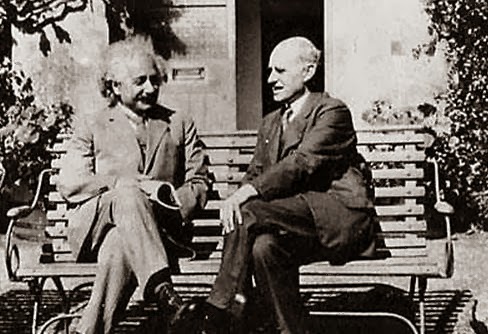
The universe, it seems, is a one way street. From the Big Bang to whatever may be its final state, it advances in one direction only: from the present to the future and never the other way around. The British physicist Sir Arthur Eddington (that’s he chatting amiably with Albert Einstein, above) memorably described this phenomenon as time’s arrow: a sort of missile that, once launched, may eventually run out of energy, but which can never reverse direction and return to the bow.
You may be surprised to learn that wine, too, has an arrow. This arrow isn’t a law of nature, but is a man-made rule designed to protect you and me from that centuries old game known as wine fraud, wherein more ordinary wine is labeled and sold as fancier goods. The scam is truly as old as wine itself, and almost all wine legislation is, at bottom, designed either to root it out or, at least, frustrate its practitioners. Part of this involves taking steps to insure that wine, like time’s arrow, moves only in a single, approved direction.
To see this in action, let’s hop over to the Burgundy region of France where wine has, since the Middle Ages, been classified according to a quality hierarchy that puts wine from pretty much anywhere in the region at the bottom; wine from vineyards located in villages known to make better wine a step above that; outstanding vineyards in these villages a further step up; the handful of vineyards with historic reputations for the very best wine of all at the top.
Invited to tour the cellar of a small family wine operation in, say, the village of Gevrey-Chambertin, we would very likely see that our host had a few barrels of wine in each of these categories, chalked to indicate their nativity. So, we might see a number of casks marked Bourgogne (generic level); several marked Gevrey-Chambertin (village level), a few from Les Cazetiers (premier cru), and finally a barrel or two of Chambertin — the grand cru vineyard from which the village takes its name.
I think you can already imagine the kind of shenanigans a vintner might get up to in the darkness and isolation of a cellar organized this way. I refer here to the temptation to boost quantities of the most valuable wine with a gift from a barrel of lesser value. In practice, this wouldn’t likely mean anything as gross as adding generic Burgundy to his grand cru. Instead, it might take the form of a kind of chain of contributions by which a little wine is drawn from its nearest less important neighbor to boost the volume of a more valuable barrel. Every wine receiving such a gift from its neighbor is thereby adulterated, however. The practice is completely illegal and the very definition of fraud. Wine cannot move UP the quality ladder.
But it can, and frequently does, move DOWN in a perfectly legal and consumer-beneficial manoeuver called declassification.
To stick with our Burgundy example, let’s imagine that in a particularly generous vintage, our winemaker produces Chambertin in excess of what is permitted by law from that august appellation. He cannot legally sell the surplus as Chambertin, but it would have been foolish for him to have taken steps during a sensational growing season to cut back on production since, while he is forbidden from bulking up wine of a better category with additions from a lesser one, he is entirely within his rights to enrich a barrel of a lower category with juice from a higher one. In a vintage like this, neighboring barrels on the lower rungs of the quality ladder get a boost as they receive bonus contributions from above. Call it wine’s one way street. Wine’s arrow, if you prefer.
While Burgundy offers a particularly lucid example of how this works, declassification goes on all over the wine world for all kinds of reasons. Recently, we’ve see a trend among naturalist/alternative winemakers to reject appellation designations that they are entitled to and instead market their wine as simple vin de table (or equivalent), since the rules that govern how wine so designated may be made are much less constraining. Often, what results is something more exciting and forward-looking than would otherwise be possible.
Say, is that an arrow stuck in your bowler, Sir Arthur — or just an errant neutrino?